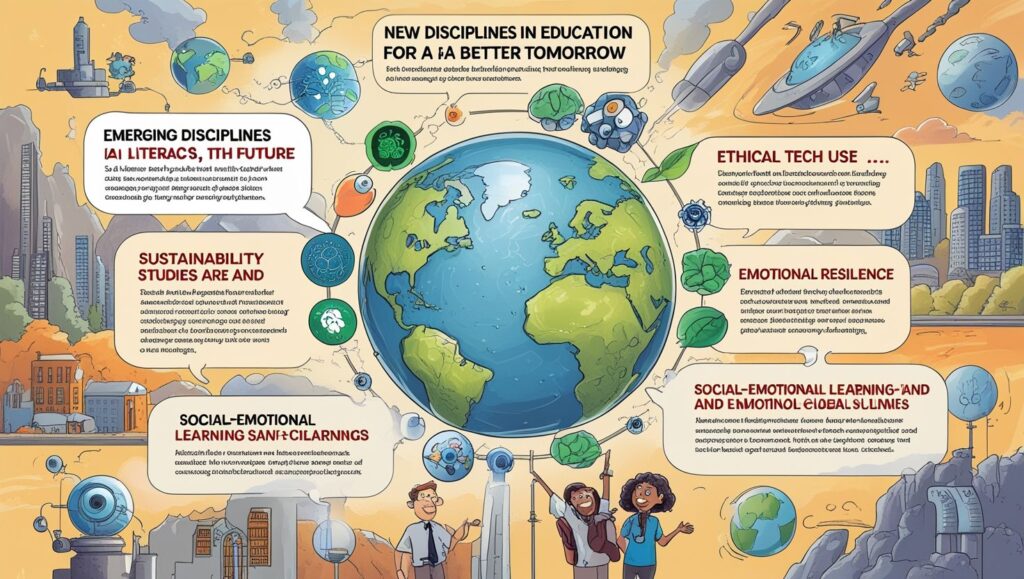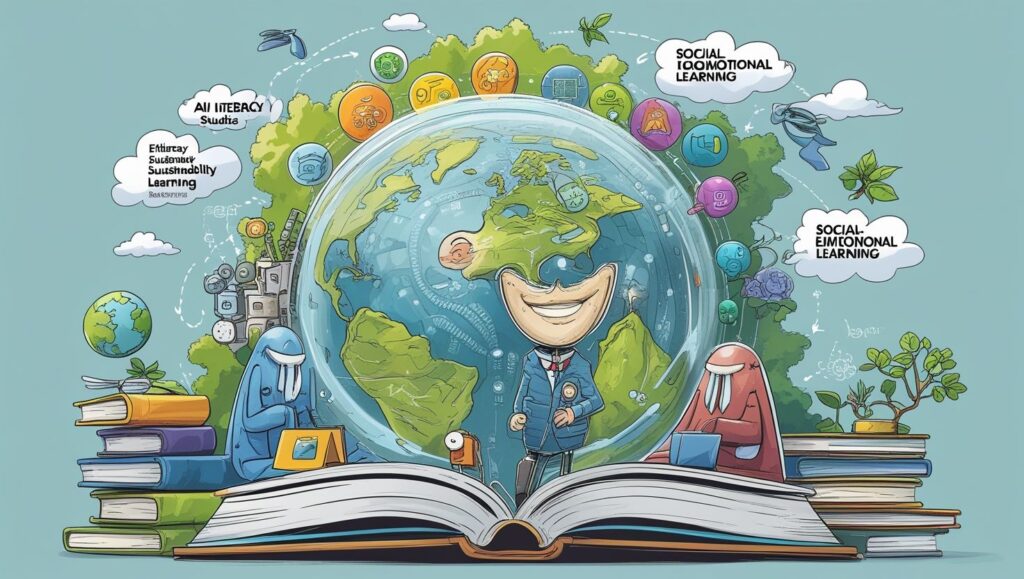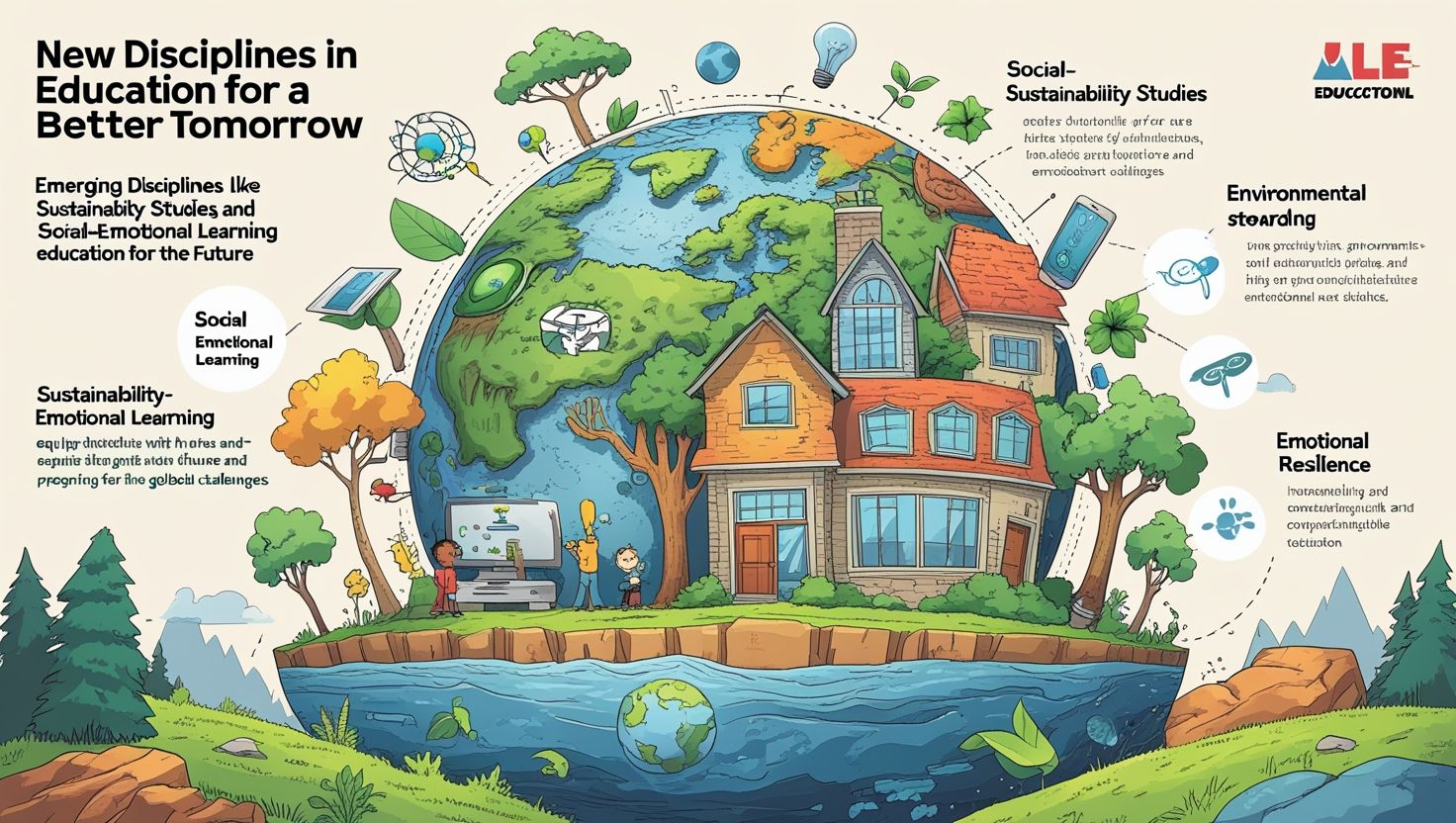1. Introduction
New Disciplines in Education for a Better Tomorrow, Education is undergoing a major transformation. Traditionally, it focused on reading, writing, and arithmetic. However, the demands of modern life are different now. As technology evolves, so must education. Therefore, new disciplines are being introduced to prepare students for a better tomorrow. These include areas like digital literacy, climate studies, artificial intelligence, and emotional intelligence. These fields were once considered secondary or irrelevant. Now, they are at the core of future-ready learning.
Moreover, these disciplines are not replacing traditional subjects. Rather, they are enhancing them. They bring a more holistic and modern approach. Additionally, these fields help students to think critically, solve real-world problems, and adapt quickly. Since the world is changing rapidly, education must keep pace. Thus, introducing new disciplines is not a luxury but a necessity. Without them, students may fall behind in the global race. Ultimately, these subjects will shape not just careers but lives. Therefore, it is essential to understand them and incorporate them into curricula. Education today must be forward-thinking. Consequently, these new disciplines are shaping a better and smarter future.
2. Artificial Intelligence and Machine Learning
Artificial Intelligence (AI) is no longer science fiction. It is now part of everyday life. Because of this, education must embrace AI and machine learning. These technologies are reshaping industries worldwide. Therefore, students should learn how they work. AI helps machines mimic human intelligence. Moreover, machine learning allows systems to learn from data. Introducing these topics in schools can give students a competitive edge. In fact, many universities are already offering introductory courses.
Furthermore, AI promotes logical thinking and problem-solving. It encourages experimentation and innovation. For instance, students can build chatbots, analyze patterns, or design smart tools. Through hands-on projects, they better understand algorithms. Also, learning AI prepares students for future careers. Jobs in AI are growing rapidly. Hence, early exposure is beneficial. In addition, understanding AI helps students become responsible digital citizens. They can think ethically about data privacy, surveillance, and automation. As AI changes the job market, education must adapt. Schools must equip learners with these powerful tools. In conclusion, incorporating AI and machine learning in education is a step towards smarter and more efficient learning.
3. Digital Citizenship and Cybersecurity
In today’s digital world, online safety is crucial. Therefore, teaching digital citizenship is more important than ever. Students need to know how to behave responsibly online. They must understand digital rights and privacy. Furthermore, they must be aware of cyberbullying and fake news. Digital citizenship teaches them how to navigate the internet safely. In addition, it promotes respect and responsibility. Alongside this, cybersecurity is becoming an essential subject. Because hackers and cyber threats are rising, students must learn how to protect data.
They should know how to create strong passwords and recognize phishing scams. Moreover, cybersecurity awareness prepares them for tech-savvy careers. Governments and companies need people skilled in online safety. Teaching these topics in schools builds a strong foundation. Furthermore, they foster critical thinking. Since young people spend more time online, this knowledge is vital. Without it, they are at risk. Thus, educators must include digital safety in lessons. They can use interactive games, real-life examples, and group discussions. Consequently, students learn in engaging ways. Ultimately, a digitally aware generation will create a safer and more ethical internet space.

4. Environmental and Climate Studies
The world is facing environmental challenges. Because of this, climate education is essential. Students must understand global warming, pollution, and resource depletion. Environmental studies help them become responsible citizens. They learn how human actions impact nature. Moreover, they explore sustainable living and green technologies. These lessons are not just theoretical. They are practical and life-changing. For example, schools can involve students in tree planting or recycling programs. These activities promote active participation. Additionally, climate studies build empathy for future generations. Students begin to care more about the planet.
As a result, they adopt eco-friendly habits. Besides, these subjects encourage problem-solving. Students brainstorm solutions for real-world environmental issues. Furthermore, climate education supports interdisciplinary learning. It connects science, geography, and even economics. Because environmental issues are urgent, schools must act now. By including these studies in the curriculum, we ensure a greener future. Consequently, learners grow into conscious global citizens. They can then influence their communities positively. Thus, environmental education plays a critical role in shaping a better tomorrow.
5. Entrepreneurship and Financial Literacy
Today’s economy demands innovative thinkers. Therefore, teaching entrepreneurship is key. Students need to understand how to create value. They must also learn how businesses operate. Entrepreneurship classes promote creativity, leadership, and problem-solving. In these lessons, students design products, create business plans, and pitch ideas. Furthermore, financial literacy is equally vital. Without it, students may struggle in real life. They should know how to budget, save, and invest.
Additionally, these subjects help them make smart choices about money. Because financial independence is empowering, early education in this area is essential. Moreover, entrepreneurship builds resilience. Students learn from failure and keep trying. They also work in teams and manage projects. These experiences prepare them for future challenges. In fact, many schools now run student-led businesses. These hands-on activities create excitement and real learning. Also, these disciplines bridge the gap between school and life. Consequently, students feel more confident and capable. By integrating entrepreneurship and financial literacy into education, we prepare youth for economic success and lifelong responsibility.
6. Social-Emotional Learning (SEL)
Academic success is important. However, emotional well-being matters too. This is where Social-Emotional Learning (SEL) comes in. It helps students understand and manage emotions. Moreover, it improves relationships and decision-making. SEL teaches empathy, self-awareness, and conflict resolution. Because many students face emotional stress, SEL is essential. Furthermore, these skills reduce bullying and anxiety. Students feel safer and more supported. In classrooms that focus on SEL, there is more trust and cooperation. Teachers and students communicate better. Also, SEL promotes mindfulness. Students become more focused and calm.
Additionally, they learn to express themselves respectfully. These life skills benefit them in every aspect. As a result, students grow into emotionally intelligent adults. Moreover, SEL prepares them for teamwork and leadership. It also supports academic performance. Research shows that emotionally strong students perform better in school. Therefore, schools must integrate SEL into daily lessons. Activities like journaling, role play, and group discussions help a lot. In conclusion, SEL nurtures both the heart and the mind. It creates a peaceful and productive learning environment.
7. Coding and Computational Thinking
In the digital age, coding is a superpower. Therefore, students must learn how to code. It’s not just for programmers. Coding teaches logic, sequence, and structure. It also fosters creativity and problem-solving. Moreover, computational thinking goes hand in hand. It helps break down problems and find solutions. These skills apply to every field. Whether in science, business, or art, coding plays a role. Additionally, coding empowers students to build apps, games, and websites. This gives them a sense of achievement. Also, coding classes encourage collaboration. Students often work in teams to complete tasks. Because of this, they develop communication and teamwork skills.
Furthermore, early exposure to coding builds confidence. Even primary students can learn through block-based tools. As they advance, they can try languages like Python or Java. Schools must support this trend. They can provide coding clubs, competitions, and online platforms. Ultimately, these skills open doors to future careers. In short, teaching coding and computational thinking is crucial for a tech-driven tomorrow.

8. Global Citizenship and Cultural Studies
The world is more connected than ever. Because of globalization, students must think beyond borders. Global citizenship education encourages this mindset. It teaches respect for different cultures and worldviews. Moreover, it promotes peace, justice, and sustainability. Students learn about global issues like poverty, migration, and human rights. These discussions build empathy and understanding. In addition, cultural studies help fight stereotypes. They celebrate diversity and inclusiveness. By learning about other traditions, students become more open-minded. They also discover shared values among cultures. This creates a sense of unity.
Furthermore, global education boosts communication skills. Students may learn new languages or participate in exchange programs. These experiences shape them into well-rounded individuals. Schools can include global topics in history, geography, or language classes. Moreover, they can host international days or cultural fairs. These events make learning fun and meaningful. In the end, global citizens are better problem solvers. They think about the world, not just themselves. Therefore, global citizenship and cultural studies are essential for a peaceful and collaborative future.
9. Media and Information Literacy
We live in an age of information overload. Therefore, students must learn how to filter it. Media and information literacy (MIL) teaches them how to find, evaluate, and use information. It also helps them understand how media shapes opinions. Furthermore, MIL combats misinformation. Students learn to fact-check and spot fake news. These skills are crucial in the digital era. Additionally, MIL promotes ethical media use. It teaches respect for content creators and intellectual property. Students also explore how media can influence behavior and beliefs.
Because of this, they become more critical thinkers. Moreover, MIL improves research skills. Whether writing a paper or posting online, students learn to be responsible. Teachers can use newspapers, videos, and websites as teaching tools. They can also discuss media bias and advertising tricks. By doing so, they prepare students for real-world decisions. As a result, learners become more informed citizens. They are not easily fooled or manipulated. Thus, media and information literacy is a vital discipline for the future.
10. Conclusion: Embracing New Educational Horizons
In conclusion, education must evolve continuously. The world is not static, so learning should not be either. As discussed, the new disciplines—ranging from AI to SEL—are shaping future-ready learners. They address the needs of the modern world. Furthermore, they promote not only academic success but also personal growth. Transitioning to these new disciplines may be challenging.
However, the benefits are undeniable. Students become more confident, capable, and compassionate. Schools that embrace these subjects stay ahead of the curve. They create innovators, thinkers, and responsible citizens. Moreover, these disciplines promote lifelong learning. They equip students with tools to thrive in uncertain times. Therefore, educators, policymakers, and parents must support this shift. Investing in these fields today guarantees a better tomorrow. In essence, the future of education lies in its adaptability. By embracing change and innovation, we pave the way for a brighter, smarter, and more sustainable world.

Really interesting read! Understanding the stats behind slots is key, and platforms like rg777 download seem to prioritize that with their data-driven approach. KYC is a must for secure play, too!
Great weblog right here! Alsso your site loads up very fast!
What host are youu using? Can I get your associate
hyperlink in your host? I want my wegsite loadewd up as quickly as yours lol https://Bookofdead34.Wordpress.com/
We stumbled over here from a different page and thought I might check things out. I like what I see so i am just following you. Look forward to checking out your web page repeatedly.
I’ve been absent for a while, but now I remember why I used to love this website. Thanks, I will try and check back more frequently. How frequently you update your site?
Well I definitely liked studying it. This post offered by you is very effective for proper planning.
This web site is really a walk-through for all of the info you wanted about this and didn’t know who to ask. Glimpse here, and you’ll definitely discover it.
I do like the way you have framed this particular challenge and it really does supply me some fodder for consideration. Nevertheless, from what precisely I have personally seen, I simply wish when the actual opinions pack on that folks continue to be on point and not embark upon a soap box regarding the news of the day. Yet, thank you for this outstanding piece and though I can not really go along with it in totality, I value the point of view.
You are my inspiration , I own few blogs and occasionally run out from to post .